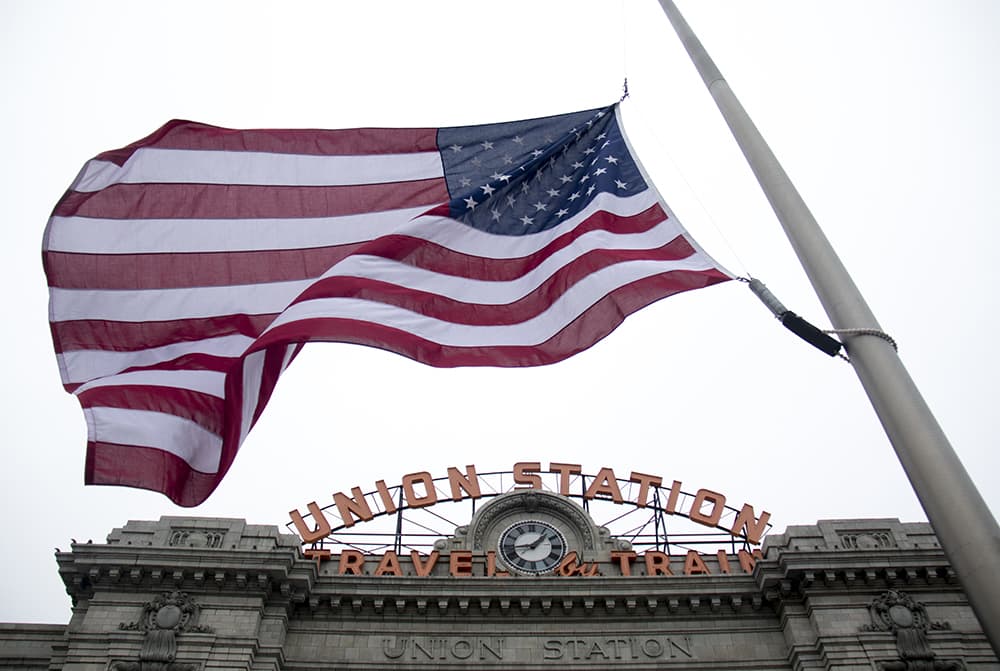Private companies have every right to close off part of Denver Union Station to members of the public who don't buy stuff, according to a contract Denverite obtained through a Colorado Open Records Act request.
Taxpayers helped fund the $518 million revival of Union Station, and it's owned by the Regional Transportation District, a public entity. But the transit agency signed away some of the general public's rights in 2012 when it agreed to terms with Union Station Alliance, a private group of companies that manages the station's day-to-day operations.
RTD explicitly empowered tenants -- Sage Hospitality Group and the guards they hire from Allied Universal Security -- to "restrict access" and "regulate the behavior of all Persons" in the Great Hall as long as transit riders have room to wait for and travel to their trains and buses, the lease agreement states.
The document makes clear who makes decisions about the publicly-owned building. It's not the public:
"The Great Hall shall at all times be part of the Tenant's Interest and nothing in this Lease ... shall constitute a dedication of the Great Hall to the public or otherwise grant to the general public any right or interest therein," states the document, signed by former RTD general manager Phillip Washington and Sage Hospitality CEO Walter Isenberg.
People and companies can also rent space inside the Great Hall for private events.
Union Station Alliance paid RTD $635,245 in 2019 to use the public building for private profit, according to the transit agency.
Union Station is RTD's most prized property but the transit agency did not flinch at Sage's decision to close the lounge to nonpaying customers earlier this month.
As long as bus and train riders aren't impeded, RTD is fine with the change, said Pauletta Tonilas, RTD's assistant general manager of communications.
"While Union Station is a public place, it's not managed as a public space," Tonilas said. "There are many things that went into the planning of that space and that was the desire of the stakeholders who worked on this whole project for many, many years."
To turn people away from the lounge area, Sage Hospitality erected a sign alerting people that the once-open space was now reserved for people who spend money at Great Hall businesses. While a Sage Hospitality spokesperson told Denverite that RTD and Amtrak customers could sit in the lounge area, the sign did not list that exception. The sign has been removed but placards on tables remain.
In a statement, Sage Hospitality spokesperson Sarah Hendricks called the new restrictions for the general public a "service extension" for people who spend money at businesses and the Crawford Hotel. An "overwhelming demand" from people who've bought food and drinks sparked the change, Hendricks said.
Allied Universal, the company hired by Sage Hospitality to enforce its policies with armed security guards, views Union Station's Great Hall as a private place.
In an interview with Denverite, Allied Universal Security's local client manager Alan Banich called Union Station "a private property building" and said it is "actually not" owned by the public. RTD, a public agency, owns the building, Denver's real estate department confirmed.
Allied security guards enforce Sage Hospitality's policy by observing people and will even ask for receipts, if necessary, Banich said, adding that they'll give people "friendly reminders" and point to the placards before asking them to leave.
People without homes use the station to warm up and charge their phones, while people who use drugs use the station to shoot up. After Denverite broke the story about the policy change, Twitter and Facebook erupted with comments claiming the move was a pretext for booting poor and homeless people from the tony station. Others said employees and the public are endangered by people who use drugs.
"It's not arbitrary in any way, shape or form," Banich told Denverite about enforcing Sage's policy. "We're not just finding random people to select."
Banich would not say how many people are asked to leave, calling that information proprietary.
The Denver Police Department has made 36 arrests -- including for drug-related crimes and robbery -- at Union Station since Jan. 1, according to DPD data.
Sage Hospitality did not respond to multiple requests to discuss pressures faced by employees at the station.
Denver Public Library's central branch is a public space frequented by people without homes and people with health problems. They deal with things differently.
"We take public -- our middle name is public -- very seriously," said Rachel Fewell, the central library administrator. "One of our primary values is (being) welcoming. And we take that very seriously as well. Every single person from every walk of life is welcome into the library."
The central branch employs 18 security guards with an estimated six working at any given time, Fewell said. None are armed. All are employees of the Denver Public Library, which she said is key "because they believe in our values and are trained in what the library does and truly believe in and support our mission."
Denver's main library has seen half the arrests of Union Station since Jan. 1, according to DPD data. Fewell said things are peaceful "99 percent of the time."
"I think it's because people are respected here," she said. "We talk to people and acknowledge people who are not acknowledged in regular society."
The library welcomes people who are cold in the winter and employees are trained to connect people with health services if they need them.
"As we continue to restrict public spaces, as we continue to get into more public-private partnerships, that does continue to concentrate all the people that need public space into the very limited footprint of space that we have," Fewell said.
While security guards do ban people occasionally, the library offers a process to reinstate them.













